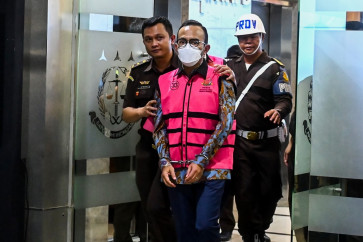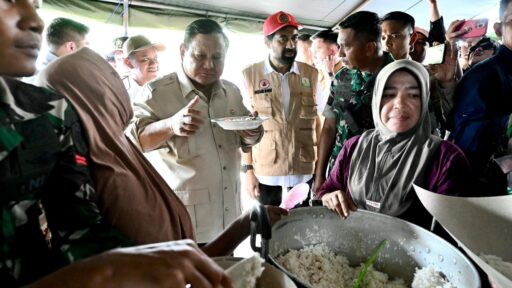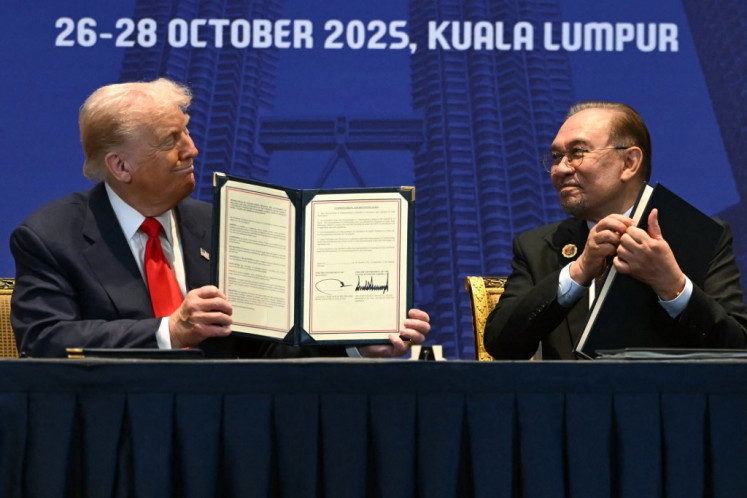Popular Reads
Top Results
Can't find what you're looking for?
View all search resultsPopular Reads
Top Results
Can't find what you're looking for?
View all search resultsGovt restricts use of 'cancer jacket'
Testing: Research and Technology and Higher Education Minister Mohamad Nasir (center) tries out a helmet-shaped electrical capacitive cancer therapy (ECCT) and electrical capacitance volume tomography (ECVT) apparatus, assisted by the inventor, Warsito Purwo Taruno (left), at the CTECH Labs Edwar Technology in South Tangerang, Banten, on Monday
Change text size
Gift Premium Articles
to Anyone
 Testing: Research and Technology and Higher Education Minister Mohamad Nasir (center) tries out a helmet-shaped electrical capacitive cancer therapy (ECCT) and electrical capacitance volume tomography (ECVT) apparatus, assisted by the inventor, Warsito Purwo Taruno (left), at the CTECH Labs Edwar Technology in South Tangerang, Banten, on Monday.(JP/DON) (center) tries out a helmet-shaped electrical capacitive cancer therapy (ECCT) and electrical capacitance volume tomography (ECVT) apparatus, assisted by the inventor, Warsito Purwo Taruno (left), at the CTECH Labs Edwar Technology in South Tangerang, Banten, on Monday.(JP/DON)
Testing: Research and Technology and Higher Education Minister Mohamad Nasir (center) tries out a helmet-shaped electrical capacitive cancer therapy (ECCT) and electrical capacitance volume tomography (ECVT) apparatus, assisted by the inventor, Warsito Purwo Taruno (left), at the CTECH Labs Edwar Technology in South Tangerang, Banten, on Monday.(JP/DON) (center) tries out a helmet-shaped electrical capacitive cancer therapy (ECCT) and electrical capacitance volume tomography (ECVT) apparatus, assisted by the inventor, Warsito Purwo Taruno (left), at the CTECH Labs Edwar Technology in South Tangerang, Banten, on Monday.(JP/DON)
T
span class="caption">Testing: Research and Technology and Higher Education Minister Mohamad Nasir (center) tries out a helmet-shaped electrical capacitive cancer therapy (ECCT) and electrical capacitance volume tomography (ECVT) apparatus, assisted by the inventor, Warsito Purwo Taruno (left), at the CTECH Labs Edwar Technology in South Tangerang, Banten, on Monday.(JP/DON)
Following a debate over possible hazards from an electrical capacitive cancer therapy (ECCT) apparatus popularly known as a cancer jacket, the Research, Technology and Higher Education Ministry, the Health Ministry and the Indonesian Institute of Sciences (LIPI) have told its inventor to limit its use.
Although the decision was not an outright ban, the Center for Tomography Research Laboratory (CTECH Labs) Edwar Technology, where neuroscientist Warsito Purwo Taruno invented the device, can no longer accept new patients.
The government gave the freedom to around 3,200 patients who have been undergoing therapy with the device to decide whether they would continue their treatment.
The Health Ministry's Research and Development Center acting chairwoman Tritarayati said on Wednesday that the device had failed to pass safety tests as regulated by the 2010 Health Ministry Regulation on distribution and marketing licenses for medical devices.
The tests also showed that the device did not have significant benefits for patients.
The ECCT device provides cancer therapy in the form of clothing that spreads electrostatic waves through the body to hamper the growth of cancer cells. The device has a maximum voltage of 15, considered a harmless level.
Warsito invented the device in 2009 after patenting in 2005 his electrical capacitance volume tomography (ECVT) technology, which allows electrostatic waves to detect fast-moving particles and is intended to reveal the condition of the brain, thus detecting cancer, Alzheimer's or epilepsy.
Tritarayati said the research on ECCT would continue until the completion of preclinical trials, with the supervision and financial assistance of both ministries. If it passes preclinical trials, the device will go on to clinical trials at a teaching hospital, such as Cipto Mangunkusumo General Hospital (RSCM) in Jakarta or Hasan Sadikin General Hospital (RSHS) in Bandung West Java.
She said the decision was a compromise to show appreciation for homegrown innovators but at the same time promote compliance with rules and regulations.
Both ministries also agreed to set up a consortium to help Warsito accelerate the research.
The use of the ECCT sparked controversy last year after the Indonesian Society of Surgical Oncology claimed the device had not been clinically trialled in Indonesian hospitals. The Health Ministry then froze Warsito's patient services in December 2015.
The Research, Technology and Higher Education Ministry's directorate general for research and development reinforcement, Muhammad Dimyati, said he supported Warsito as well as other inventors and innovators in making breakthroughs but warned that not all research led to success.
'We also have to consider the importance of complying with rules and regulations in the medical field before introducing new devices or methods, particularly for major diseases such as cancer,' Dimyati said.
Warsito praised the ministry's decision to help him develop the ECCT research, but acknowledged that it was difficult to meet requirements because the country lacked basic standards for medical inventions.
Warsito said he only wanted to help people suffering from cancer and fulfill the country's increasing demand for medical innovations.
Dita Dewi Prabaningrum, 51, one of Warsito's patients, who was diagnosed with stage three breast cancer in 2011, said Warsito's device had worked wonders for her, adding that she had initially been told the likelihood of her cancer being terminal was 80 percent. 'After having electrical jacket therapy for four months, it became 40 percent. Earlier last year, he said it was 38 percent,' she said.









